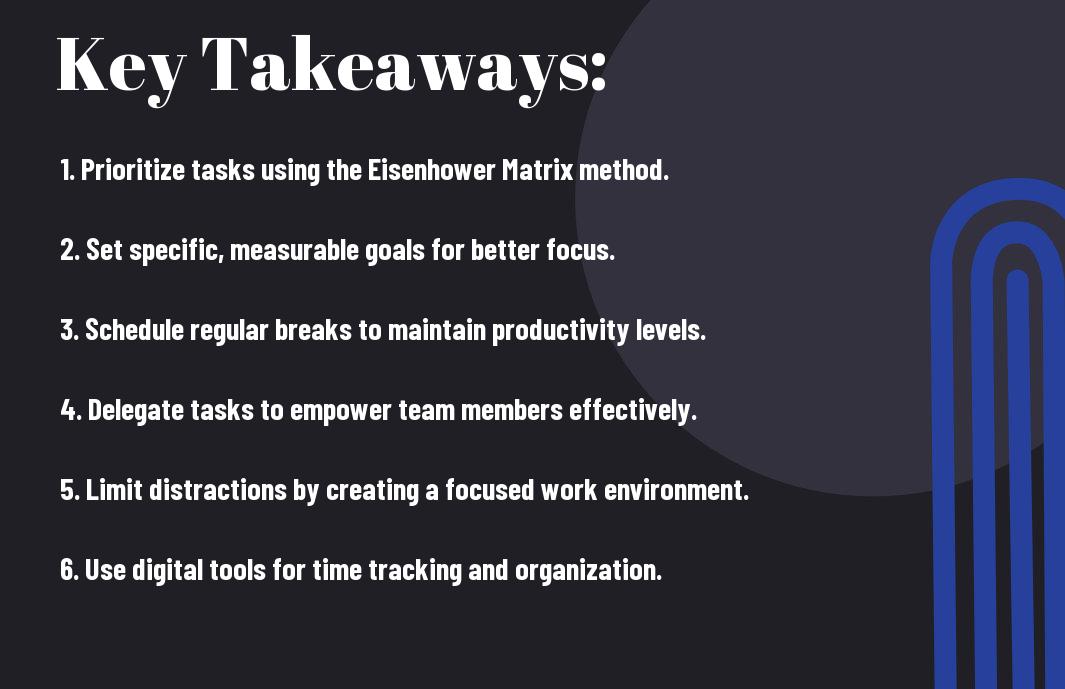
You can enhance your productivity and streamline your operations by mastering effective time management. As a business owner, your time is one of your most valuable assets, and how you utilize it can significantly impact your success. In this post, you will discover practical strategies to prioritize tasks, delegate responsibilities, and create efficient workflows that enable you to focus on what truly drives your business forward. Embrace these tips to take control of your schedule and achieve your goals more effectively.

Understanding Time Management
Before stepping into effective strategies, it’s crucial to grasp the concept of time management. Time management involves organizing and planning how to divide your time between various activities, enabling you to work smarter, not harder. By prioritizing tasks and setting goals, you can enhance your productivity and achieve your business objectives more efficiently.
The Importance of Time Management
Time is one of your most valuable resources as a business owner. Properly managing it allows you to focus on what truly matters—driving growth and innovation. By utilizing time management techniques, you not only improve your efficiency but also gain a sense of control over your tasks, leading to reduced stress and better decision-making.
Common Time Management Challenges
Behind every business owner lies a myriad of distractions and responsibilities that can hinder effective time management. Juggling multiple tasks, facing interruptions, or struggling with procrastination are common issues that many entrepreneurs encounter. Understanding these challenges is your first step toward overcoming them and creating a more productive schedule.
But these challenges can often feel overwhelming. You may find that an unexpected meeting disrupts your planned workflow, or you might struggle with prioritization, leading to focus on less important tasks. Procrastination can creep in when deadlines loom, making it difficult to maintain momentum. Identifying these barriers is crucial to implementing practical solutions, allowing you to reclaim your time and enhance productivity.
Setting Priorities
You need to set clear priorities to ensure your time is spent on what really matters for your business. By aligning your tasks with your overall goals, you can focus on high-impact activities that drive success. This not only enhances productivity but also reduces stress, allowing you to make more strategic decisions with the time you have.
Identifying Key Tasks
The first step in setting priorities is identifying key tasks that contribute directly to your objectives. Break down larger goals into smaller, actionable tasks and evaluate their importance and urgency. This step will guide you in focusing on what truly moves your business forward, ensuring you allocate your time effectively.
The Eisenhower Matrix
Across the business world, the Eisenhower Matrix is a popular tool for prioritizing tasks based on urgency and importance. By categorizing your tasks into four quadrants, you can clearly see what needs your immediate attention and what can be delegated or scheduled for later.
It helps you to distinguish between tasks that are urgent and important, allowing you to tackle high-priority items first. The matrix consists of four categories: urgent and important, important but not urgent, urgent but not important, and neither. This clear visual aid prompts you to focus on strategic actions, minimize distractions, and efficiently allocate your time, ultimately enhancing your productivity and effectiveness as a business owner.
Planning and Scheduling
All successful business owners know that time management begins with effective planning and scheduling. Establishing a clear roadmap for your tasks allows you to prioritize important activities and allocate resources efficiently. By creating a consistent planning routine, you can transform your productivity, reduce stress, and achieve more with less effort.
Daily vs. Weekly Planning
Against the common belief that daily planning is superior, many find that a combination of daily and weekly planning offers the best results. While daily planning addresses immediate priorities and allows for flexibility, weekly planning enables you to take a broader view of your goals and commitments. Balancing both methods helps you stay organized while adapting to unforeseen changes.
Utilizing Digital Tools
Utilizing digital tools can significantly streamline your planning and scheduling process, enhancing your overall productivity. By integrating task management apps and calendar software into your routine, you can effortlessly organize tasks, set reminders, and collaborate with team members in real-time.
Digital tools offer numerous features that can maximize your efficiency. For instance, project management applications enable you to break down complex tasks into manageable steps, track progress, and delegate responsibilities. Additionally, shared calendars can facilitate communication among your team, ensuring everyone is aligned on deadlines and meetings. By embracing technology, you can transform your planning strategy from cumbersome to dynamic, empowering you to focus on what really matters for your business.
Delegating Effectively
Not every task requires your personal attention. Effective delegation empowers your team and frees up your time to focus on strategic decisions. By identifying which tasks can be entrusted to others, you foster a more productive work environment and enable team members to develop their skills. This not only enhances overall team performance but also allows you to concentrate on the core aspects of your business that require your expertise.
Knowing When to Delegate
Effectively determining the right time to delegate involves assessing your workload and recognizing tasks that can be handled by others. Consider delegating repetitive or lower-priority tasks that consume your time but do not require your specific expertise. By prioritizing your efforts on high-impact activities, you can significantly boost your business’s overall productivity and efficiency.
Building a Trustworthy Team
Building a trustworthy team requires establishing a foundation of communication and reliability. Start by selecting individuals whose skill sets and values align with your business goals. Foster an environment of transparency, and encourage open dialogue to ensure that everyone feels comfortable taking ownership of delegated tasks. Trust is developed through consistent follow-through and accountability, so make it a priority to provide resources and support to your team, ensuring they have the tools they need to succeed.
The key to building a trustworthy team lies in cultivating relationships based on mutual respect and understanding. Provide opportunities for professional development, encourage collaboration, and recognize achievements. By empowering your team and demonstrating your confidence in their abilities, you create a culture where individuals feel valued and reaffirmed, which ultimately enhances their commitment to the tasks you delegate. In this supportive environment, your team is more likely to take initiative and deliver high-quality results.
Avoiding Procrastination
Your ability to avoid procrastination sets the tone for your productivity as a business owner. By actively combating this tendency, you can better allocate your time and resources to tasks that require immediate attention and focus. The key is to develop a proactive mindset that prioritizes action over delay, thus enhancing your overall efficiency and effectiveness in managing your business responsibilities.
Techniques to Overcome Procrastination
Techniques to overcome procrastination include breaking tasks into smaller, manageable pieces, and employing the Pomodoro Technique, which involves working in focused intervals followed by short breaks. Additionally, seeking social accountability by sharing your goals with peers or mentors can create external motivation, pushing you to complete tasks timely and efficiently.
Setting Realistic Deadlines
Above all, setting realistic deadlines is necessary for maintaining momentum in your work. By defining achievable timeframes for your tasks, you reduce the potential for overwhelm and create a structured environment conducive to productivity.
Deadlines help keep your projects on track while preventing burnout. Assess your workload and estimate how long each task will realistically take, factoring in any external commitments you might have. When deadlines are attainable, they serve as motivating benchmarks that encourage focus and determination, enabling you to progress steadily and avoid the pitfalls of procrastination.
Maintaining Work-Life Balance
Despite the demands of running a business, maintaining a work-life balance is important for your overall well-being and effectiveness. Prioritizing this balance not only sustains your health but also enhances your decision-making and creative capacities. Allocate specific hours for work and personal time, and stick to them. This will help you recharge, ultimately contributing to the long-term success of your business.
The Impact on Productivity
Across various studies, a strong work-life balance is linked to heightened productivity and job satisfaction. When you allocate time for both work and personal life, you cultivate a motivated mindset that enhances your focus and efficiency. Balancing these aspects allows you to tackle tasks with renewed energy, leading to better performance and outcomes in your business.
Strategies for Balance
Before you can achieve a good work-life balance, it’s important to implement specific strategies that suit your lifestyle. Setting clear boundaries, prioritizing tasks, and incorporating regular breaks can make a significant difference. Utilize tools like calendars and reminders to keep your schedule organized, ensuring both work and personal commitments receive adequate time and attention.
In fact, establishing designated work hours can prevent overlaps that lead to burnout. Scheduling regular downtime, whether for exercise, hobbies, or family time, will help you decompress and recharge. Consider delegating tasks or using automation tools to ease your workload. By regularly assessing your priorities and adjusting them as needed, you can create a harmonious balance that supports both your business growth and personal fulfillment.
To wrap up
Summing up, mastering effective time management is key to your success as a business owner. By prioritizing tasks, setting clear goals, and utilizing tools to streamline your processes, you can enhance productivity and reduce stress. Allocating time wisely not only helps you meet deadlines but also allows you to focus on driving your business forward. Embrace these strategies, and you’ll find a more balanced approach to managing your time and resources.
Leave a Reply